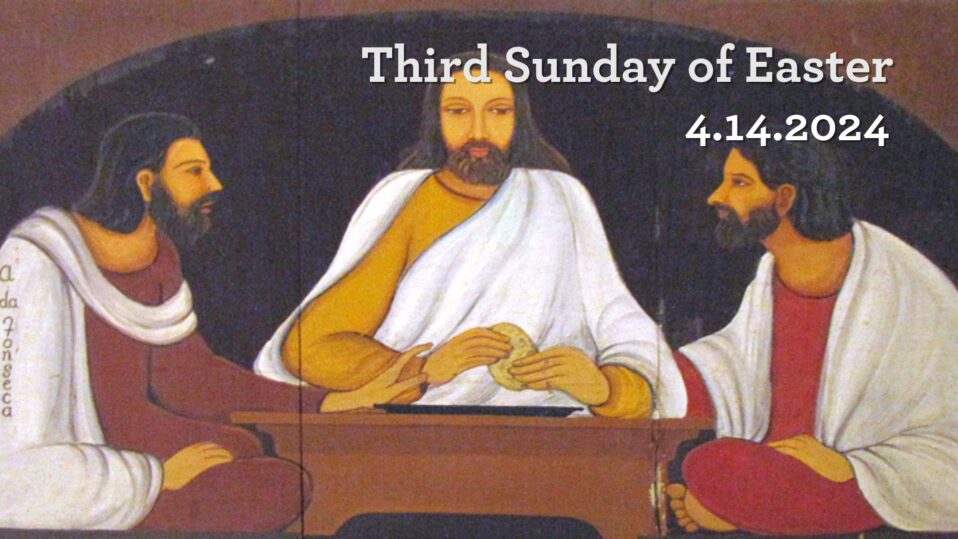We continue in the Gospel of John this morning and pick up from where we left off last week, in a speech Jesus gives to his disciples, called the farewell discourse. It’s Jesus’ graduation address to his disciples. It’s his final words of wisdom, before he goes away, and he lets them go. Preacher Fred Craddock likens this speech to when parents are getting ready to go out for the night and suddenly the children become aware of what is happening and start getting anxious and suddenly have a lot of questions:
- Where are you going?
- Why can’t I go with you?
- Who is going to stay with us?
The only question the disciples don’t ask is, can I stay up later and have an extra scoop of ice cream.
Previously, Jesus has repeatedly told the disciples where he is going and what is going to happen, but they never seem to quite get it. Here, though, he speaks to that last question, and promises that another Advocate will follow, guiding and staying with them to assure them of his (and God’s) constant and abiding presence. This is how they will know that his promises are true, the advocate will stay with them, and continues to stay with us.
The Advocate that Jesus promises is who we know as the Holy Spirit. John describes it for the first time here in this passage using the Greek word parakletos. You’ll often see it translated as “Paraclete” because it is a word so rich with meaning. Its roots mean “called alongside,” and it can signify a variety of roles: Comforter, Encourager, Exhorter, Helper, Appealer, Advocate. John seems to draw upon all of these meanings to address the variety of ways in which the Holy Spirit will engage with Jesus’ disciples. The Greek word Paraclete cannot be fully translated into English. There is not one word that fully captures what it means.
There are two big statements here that I think go together – one if you love me, you will keep my commandments and two, Jesus is leaving and providing an advocate to be with them as they live out his commandment. First of all, let’s make sure we all agree on what it means to follow Jesus commandment, because that seems to be debatable today. What is it that Jesus commands? Jump forward to the next chapter where Jesus gives the answer – he says, this is my commandment: that you love one another as I have loved you.
Second, Jesus says an advocate is going to be given to you to help you live out that commandment. Think for a second about any time you have been an advocate or have had an advocate – what was their role, what did you do for the person, or what did they do for you? Who has come alongside you in your life and whom have you come alongside?
Atticus Finch teaches his daughter Scout the meaning of both advocacy and this commandment in these simple few sentences in To Kill a Mockingbird. First of all, if you learn a simple trick, Scout, you’ll get along a lot better with all kinds of folks. You never really understand a person until you consider things from his point of view . . . until you climb into his skin and walk around in it. An advocate sees the world through somebody else’s needs and is able to put themselves in the position of others.
If you have ever sat with a friend or family member in a nursing home or a hospital, you know how important it is to have an advocate. The difference in care between someone who has an advocate and someone who doesn’t is real. Often advocates speak for people who do not have a voice, for someone who is too sick to ask for help, too young to have a voice, too old to understand, too poor to have the resources. All of those needs require someone to care enough to and be compelled to be an advocate.
Where would Jesus stand in at the border crossing between Mexico and the United States? Where is the Paraclete for asylum seekers? We may have different opinions around immigration laws policies, but we cannot pretend like there aren’t living children who are caught in the middle of that debate. Children from the so-called Northern Triangle countries of El Salvador, Guatemala, and Honduras accounting for three-quarters of unaccompanied children apprehended at the southern U.S. border in FY2022.
Today we hear news reports that children are working in conditions that bring to mind the workhouses in Britain in 1800’s. Children are working in factories in dangerous conditions, not just in underground companies, but in major companies like Cheerios, Nabisco, and meatpacking plants. How do we advocate for children that nobody seems to care about?
Jesus says, this is my commandment, that you love on another. The human laws that we make do not override the commandments that God has made. Our laws will change, God’s laws are eternal.
Now maybe being an advocate for global or national issues is not where you feel led. Maybe your compassion for your neighbor closer to home. Parker Palmer is a famous writer and speaker, who suffers from depression. He told this Krista Tippett in her show On Being:
’ll just tell that story quickly, because it’s such a great image for me. I had folks coming to me, of course, who wanted to be helpful, and sadly, many of them weren’t. These were the people who would say, “Gosh, Parker, why are you sitting in here being depressed? It’s a beautiful day outside. Go feel the sunshine and smell the flowers.” And that, of course, leaves a depressed person even more depressed, because while you know, intellectually, that it’s sunny out and that the flowers are lovely and fragrant, you can’t really feel any of that in your body, which is dead in a sensory way. And so, you’re left more depressed by this “good advice” to get out and enjoy the day. And then other people would come and say something along the lines of, “Gosh, Parker, why are you depressed? You’re such a good person. You’ve helped so many people, you’ve written …” You’re so successful, and you’ve written so well.” And that would leave me feeling more depressed, because I would feel, “I’ve just defrauded another person who, if they really knew what a schmuck I was, would cast me into the darkness where I already am.”
There was this one friend who came to me, after asking permission to do so, every afternoon about 4 o’clock, sat me down in a chair in the living room, took off my shoes and socks, and massaged my feet. He hardly ever said anything; he was a Quaker elder. And yet, out of his intuitive sense, from time to time would say a very brief word like, “I can feel your struggle today,” or, farther down the road, “I feel that you’re a little stronger at this moment, and I’m glad for that.” But beyond that, he would say hardly anything. He would give no advice. He would simply report, from time to time, what he was intuiting about my condition. Somehow, he found the one place in my body, namely the soles of my feet, where I could experience some sort of connection to another human being. And the act of massaging just — in a way that I really don’t have words for — kept me connected with the human race.
What he mainly did for me, of course, was to be willing to be present to me in my suffering. He just hung in with me in this very quiet, very simple, very tactile way. And I’ve never really been able to find the words to fully express my gratitude for that, but I know it made a huge difference. And it became, for me, a metaphor of the kind of community we need to extend to people who are suffering in this way, which is a community that is neither invasive of the mystery nor evasive of the suffering, but is willing to hold people in a space, a sacred space of relationship, where somehow this person who is on the dark side of the moon can get a little confidence that they can come around to the other side.
A final note. If you struggle with depression or anxiety, you are not alone. Jesus has not left you orphaned. There is an advocate inside of you, who loves you from the inside out, who will walk along beside you and leave your side. I love this poem by Anita Burrows called Questo Muro:
You will come at a turning of the trail
to a wall of flame
After the hard climb & the exhausted dreaming
you will come to a place where he
with whom you have walked this far
will stop, will stand
beside you on the treacherous steep path
& stare as you shiver at the moving wall, the flame
that blocks your vision of what
comes after. And that one
who you thought would accompany you always,
who held your face
tenderly a little while in his hands—
who pressed the palms of his hands into drenched grass
& washed from your cheeks, the tear-tracks—
he is telling you now
that all that stands between you
& everything you have known since the beginning
is this: this wall. Between yourself
& the beloved, between yourself & your joy,
the riverbank swaying with wildflowers, the shaft
of sunlight on the rock, the song.
Will you pass through it now, will you let it consume
whatever solidness this is
you call your life, & send
you out, a tremor of heat,
a radiance, a changed
flickering thing?”
Amen.
Rev. Dr. Shelly Wood



